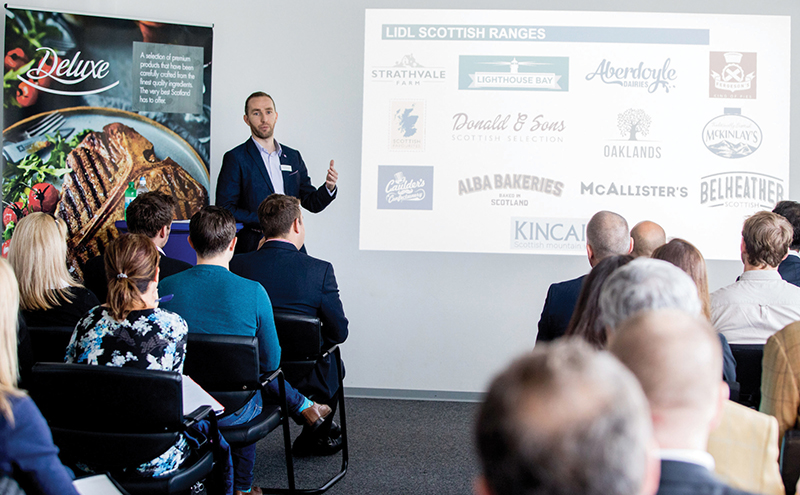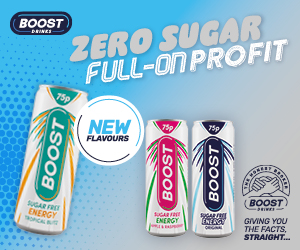Discounter dealing with more local producers than ever

MUCH has changed in retailing since the global financial market took a long walk off a short pier in 2008 and, while the years since have been less than stellar for many, discounter Lidl has enjoyed growth to make even the ‘big four’ blush.
This exponential growth – which recently saw Lidl leapfrog Waitrose to become the seventh biggest supermarket in the UK – hasn’t just been good for the firm. Paul McQuade, Lidl’s head of buying in Scotland, reckons it’s also brought some welcome windfalls for Scottish producers.
Over the last 18 months, Lidl has been snapping up supply deals across the country, with the discounter’s Scottish range now approaching 300 products sourced from over 50 suppliers, the result of a 65% increase in locally-sourced products in 2016 which was further boosted by one quarter in summer 2017.
And while McQuade said the process that has seen Lidl markedly increase its Scottish range was “quite a detailed” one, the buyer believes it can be summed up as an exercise in reaching out to suppliers to see just what it is they can do for the discounter.
“We’ll try and speak to suppliers to say ‘can you produce a quality product for us?’
“If they can, after that the T&Cs of it is to see if they’re accredited, to either have as a minimum a Small and Local Supplier Accreditation (SALSA), or if they’re bigger it would be BRC accreditation they would need. If they’ve got that we’re able to develop products with them,” he said.
Working out of Lidl’s Scottish buying offices above the discounter’s Victoria Road store, McQuade started out in his role as a one man band, but as the discounter’s market share has expanded so too has the team in Scotland, which now has five bodies on the buying trail.
McQuade expects that in Scottish produce terms, Lidl will break the 300 product barrier before the year is out, although that doesn’t mean consumers should expect to see doubling up across categories.
“We’re a limited range retailer, so we’re never going to have 20 variants of, for instance, shortbread. We will pick the best one, the best format for our customer based on where we are. We do a lot of category analysis with Kantar, finding out what customers want before we go and get a supplier to do it.
“When we do go to a supplier, we’re effectively saying quality-wise we want to be as good as, if not better than, anyone else. We’ll then just go through a whole process of trying tons of beer, tons of shortbread, whatever category it happens to be, until we’re happy we’ve got the quality that we think is better than anyone else.”
We’re a limited range retailer so we’re never going to have 20 variants. We pick the best one for our customers.
There’s no question that when dealing with suppliers, the Lidl team has its own ideas in terms of quality and packaging, with the firm often engaging in consumer focus groups, but McQuade said suppliers still have a big say in the final product.
“The suppliers have a huge amount of input, at the end of the day they’re going to be producing the product for us.
“For all it’s an own-label product, I always say this to the suppliers: it is a joint collaboration and the suppliers are the lifeblood.”
McQuade highlighted the supplier event which Lidl held in Scotland in September, the first of its kind in the UK, as an occasion where the discounter met with existing and potential Scottish suppliers, outlining the opportunities a Lidl listing can offer both at home and abroad.
“We do a lot of export products,” said McQuade, “There are some that maybe aren’t as transferable but the ones that are, shortbread, oatcakes, beer, whiskies, they’re sold everywhere.”
Figures presented to suppliers at the September event suggested Lidl UK exports £300m worth of products per year, one third of which is whisky.
If past form is anything to go by, this figure could be set to rise too, as Lidl entered the US market in June with a handful of stores and ambitious plans that should see the discounter operating over 100 sites across the Atlantic after the first year, offering further export potential for its suppliers.
Expansion closer to home could also provide opportunities for Scottish suppliers according to McQuade, who reckons the firm’s new distribution centre at Eurocentral in North Lanarkshire, scheduled for completion in winter 2019, could open up a host of opportunities.
“This is the future, we’re going to more than double the size of the regional distribution centre, so we’re going to be able to facilitate more stores but similarly there’s going to be more space for new products in terms of being able to actually house them and get deliveries in,” he said.
“Right now we’re very much at capacity so when this comes on board it’s going to open up a lot of doors for Scottish suppliers.”














